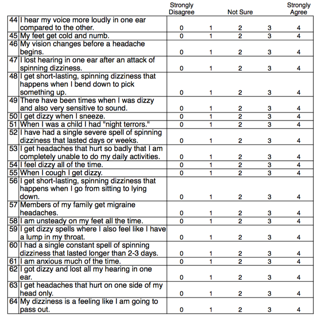
Validated PROMs are of utmost importance when examining vestibular disorder unfortunately, to date, there has been no such instrument in Kurdish that can quantify the impact of vestibular disorders. To our knowledge, there is no validated vestibular PROM in Kurdish therefore, we cross-culturally adapted the DHI into Central Kurdish dialect (DHI‒CK) and verified its reliability and validity. The original English version of the DHI has been cross-culturally validated in many other languages, including several languages that are spoken in the Middle East: Hebrew 11, Arabic 12, Persian 13, and Turkish 14. The total sum of the scores in three sub-scales (DHI‒T) range 0–100, with higher score indicating greater self-reported handicap. For each item, the respondent must select one of three responses, each assigned a specific value ( yes = 4, sometimes = 2, and no = 0). The 25-item tool comprises three sub-scales: physical (DHI‒P 7 items), emotional (DHI‒E 9 items), and functional (DHI‒F 9 items). It is a widely used PROM in the vestibular field 10. The Dizziness Handicap Inventory (DHI) was developed by Jacobson and Newman 9. Therefore, in addition to translation and cultural adaptation, reliability and validity must also be repeated and reported in harmony with the noted guidelines 8. Translation of a valid instrument to another language may dissipate its quality because of cultural differences among populations. The outcome data of any measurement-instrument are trustworthy only if that instrument has been academically subjected to reliability and validity testing 5.

However, for PROMs to be qualified, they must be reliable otherwise, performing clinical research and/or practice with instruments of poor quality is unethical and a waste of resources 7. PROMs are a quick, authentic way to measure the impacts of demanding disorders 5, 6. Therefore, over the past few decades, researchers and clinicians presented a satisfactory solution to quantify the symptoms through development of suitable instruments: patient-reported outcome measures (PROMs), which are typically complete via self -administered questionnaires. Objective findings such as caloric tests, laboratory results, and even radiological investigations are of limited value if they do not coincide with clinical findings 4. Patients with vestibular disorders require frequent visits to primary care centres 2 furthermore, their assessment is challenging, and the symptoms and consequences produced by these disorders are imprecise, subjective, and difficult to study and quantify 3. Vestibular symptoms are common and are associated with major health and cost issues 1. It is a reliable and valid tool that can be used by clinicians and researchers to quantify vestibular disorder outcomes in Kurdish -speaking populations. The DHI −CK was cross-culturally validated. The receiver operating characteristic curve analysis confirmed discriminating validity. Convergent validity was supported by Spearman’s correlations between the DHI −CK and the comparators. The DHI −CK and its three sub-scales-Physical, Emotional, Functional-exhibited good to excellent external reliability: ICCs in the test-retest were 0.93, 0.88, 0.91, and 0.92, respectively. Patients (n = 301 mean age = 44.5 ± 15.2 years 59.8% women) presenting with vestibular symptoms for at least 30 days who were diagnosed with a vestibular disorder and healthy participants (n = 43 mean age = 42 ± 17.9 years 62.8% women) (N = 344). External and internal reliability were tested with intraclass correlation coefficient (ICC) and Cronbach’s alpha/composite reliability, respectively.

Along with the DHI −CK, two comparators were introduced: the Visual Analogue Scale and the Clinical Test of Sensory Interaction and Balance. A cross-sectional study was utilised to measure the impacts of vestibular disorders. We cross-culturally adapted the Dizziness Handicap Inventory (DHI) into Central Kurdish dialect (DHI −CK) and verified its reliability and validity.


 0 kommentar(er)
0 kommentar(er)
